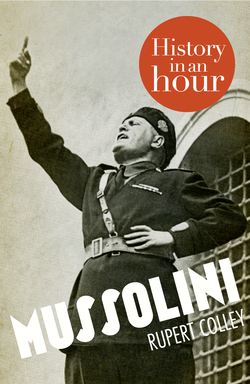Читать книгу Mussolini: History in an Hour - Rupert Colley - Страница 10
The Matteotti Crisis
ОглавлениеMussolini may have been ready to bend souls but despite being prime minister, and foreign minister, he was still far from obtaining absolute power. He headed a government in which his party was still very much a minority and at the mercy of the governing coalition. He was forced to work within the confines, as he saw it, of democracy. Thus Mussolini now took steps towards his ultimate goal – dictatorship. Two months after the March on Rome, he formed the Fascist Grand Council, ostensibly to act as a conduit between his party and the Chamber of Deputies. The Grand Council had the power to dispose of its head but only Mussolini had the power to convene meetings and set its agenda, making such power essentially theoretical. Filled with his supporters, it was, in practice, merely a mouthpiece for Mussolini and a means of diminishing parliament’s voice. Meanwhile, his blackshirts continued to police the streets, suppressing opposition and silencing dissent by means of violence and coercion.
In 1923, the Grand Council passed the Acerbo Law, named after its author Giacomo Acerbo. The law rigged the electoral system in such a way that come the next elections, Mussolini would gain a sizeable majority. The socialists tried to block the Act becoming law but were left in a minority.
Come the national elections five months later, on 6 April 1924, Mussolini’s rightist coalition, unsurprisingly, won convincingly, gaining 374 of the 535 seats (almost 70 per cent). It was not so much Acerbo’s Law that smoothed Mussolini’s path to victory, but the heavy presence of his blackshirts ensuring people voted accordingly. Opposition party meetings had been disrupted, opponents beaten in broad daylight, and, on election day, ballot boxes stolen and their contents tampered with.
While Mussolini basked in the false glory of an overwhelming victory at the polls, socialist politician, Giacomo Matteotti, spoke out against the election, claiming that fraud and intimidation had won it for the fascists. During a parliamentary meeting on 30 May 1924, ignoring catcalls and thinly veiled death threats, Matteotti publicly criticized the fascists. At the end of his impassioned speech, he turned to a colleague and said, ‘And now you can prepare my funeral oration.’
Sure enough, eleven days later, on 10 June, Matteotti was bundled in a car on the streets of Rome, never to be seen again. Matteotti’s disappearance caused a national outcry; people took to the streets calling on the king to depose Mussolini. Mussolini, while comforting Matteotti’s wife and claiming he knew nothing about it, voiced his revulsion over the crime. This, at the infancy of his rule, was Mussolini’s most vulnerable period. The extent of Mussolini’s complicity has long since been debated. There was no proof of Mussolini’s involvement, but he did know the perpetrators, particularly the ringleader, a notorious one-handed thug by the name of Amerigo Dumini, a member of the Ceka, Mussolini’s secret police. Indeed, Dumini presented Mussolini a piece of bloodstained upholstery from the car. In August, Matteotti’s body was found – dumped in a wasteland outside Rome, a knife still sticking out of his chest. Mussolini quickly distanced himself and ordered the trial of the scapegoats. Dumini, together with his Ceka accomplices, was handed a five-year jail sentence, of which he served less than a year.
In disgust at Matteotti’s murder, politicians of all persuasions withdrew from parliament, hoping to force the king into removing Mussolini from office. The ‘Aventine Secession’, as it became known, backfired – the king stood by his prime minister. When, on 3 January 1925, Mussolini faced a vote of confidence, his principal opponents were conspicuous by their absence. Under pressure from the more extreme elements of his party to form a fascist dictatorship, or risk removal, Mussolini took the opportunity to consolidate his power. ‘I and I alone assume political, moral, and historical responsibility for what has happened,’ he said without referring to Matteotti directly. He had, he said, created the climate of violence. But if Italy wanted stability then only the fascists could provide it, even if it took violence to enforce it. It was a pivotal moment in Mussolini’s development. He had survived the Matteotti crisis and, with his opponents absent and weakened, had regained the initiative. The date of 3 January 1925 marked the beginning of Mussolini’s dictatorship.
